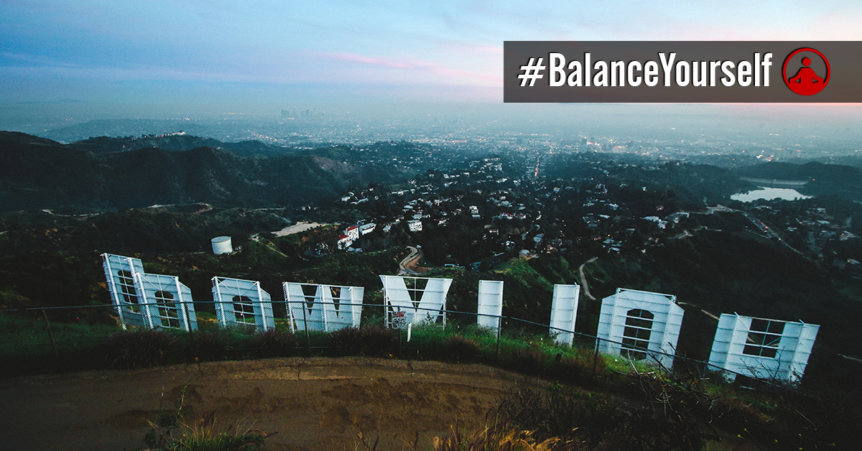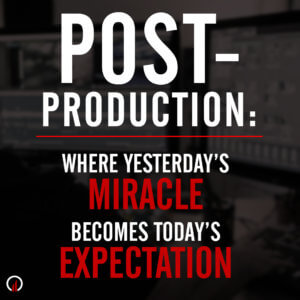Author’s Note: The following is just one in a series of my impassioned letters to the entertainment industry titled “Dear Hollywood” that I’ve written over the last several years that examines and questions how we fundamentally live and work in this business.
In the wake of the possible IATSE strike I wanted to share my two cents specifically regarding turnaround times and overall hours. I know the pension plan is the headline of negotiations (as it should be), but I want to ensure we’re not overlooking the health, safety, and sanity of everyone working behind-the-scenes. A pension plan is meaningless if you don’t live long enough to use it.
For those of us in Hollywood working behind computers in dark rooms for a living, will there ever come a time when we realize it’s counterproductive, unhealthy, and downright dangerous to work insane hours at the expense of our health and our creativity simply for the sake of our jobs?
How much is our time (and our sanity) really worth?
For years now I’ve stood on my soapbox proclaiming from the hills that sitting is killing us and that success happens BECAUSE you prioritize your health above your career, not DESPITE it. If you think living in a dark room for sixteen hours a day under constant stress is good for your creativity, think again.
If you value your health, all you have to do is ask yourself this simple question honestly:
Is the job you’re doing every single day worth dying for?
If your answer to this question is ‘No,’ I suggest reading on. Because if we don’t begin collectively standing up for ourselves and do what’s necessary, things will only get worse.
C’mon…Is It Really That Bad?
Wait a second…using words like “unhealthy” or “dangerous” is irresponsible. For those of us who are film editors, visual effects artists, composers, animators, and everyone in between, we just sit at desks all day long in air conditioned luxury suites and have our meals handed to us twice a day on a silver platter. We’ve got it easy!
It’s not like we’re blue collar workers slaving away in steel factories or coal mines losing limbs or dying of black lung…..(Note: The typical seated office worker has more injuries than any other industry sector worker including construction, the metal industry, and transportation1).




It’s not like we suffer through grueling days on movie sets working sixteen to twenty hours a day, often deep into the following morning…..



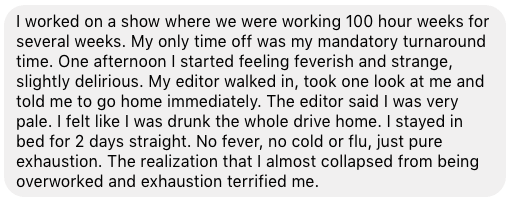
And we certainly aren’t out on the front lines sacrificing our lives for the sake of a stunt or “getting the perfect shot”…..
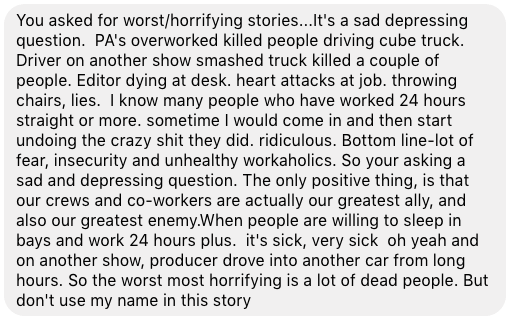
Here’s the difference:
All of the dangerous professions listed above have rigorous safety regulations to protect the health and wellbeing of their workforce with extensive training to minimize accidents. Those of us in post-production are told in the same safety meetings to bring a cardigan because it can sometimes get “chilly in the edit suite.” Tee-hee.
If someone dies after falling off scaffolding while doing a stunt or is (God-forbid) hit by a train while setting up a shot, the entire community rallies around this negligence. There’s no choice but to address the problem and ensure the same mistakes aren’t made in the future. When someone is recklessly injured or killed while on the job in a public setting, people pay attention.
Sedentary “creative workers” are unfortunately not afforded the same protections. If we’re asked to work through lunch (for free), we don’t have a crew of 150 people to demand we all get meal penalties. If we’re expected to work 16 (or more) hours every day sitting in a small dark room without breaks or weekends off, we feel like we’re all alone if we’re being treated unjustly and have no choice but to submit.
If someone working in any sector of the post-production industry dies as a direct result of the long hours, the chronic stress, the poor working conditions, or gets into a car accident as a result of sleep-deprivation, it’s no different than a tree falling in the woods when no one else is around.

If an editor dies in the edit bay, does it make a sound?
The sad fact is there are countless stories of people dying (or barely surviving 3 heart attacks in 24 hours) as a direct result of their jobs working in post-production (Unfortunately nobody is willing to share the details of those stories publicly). We may mourn those who pass from cancer, but because stress is a slow burn, despite it being the number one cause of death in first world societies, nobody notices or creates a direct connection between the diseases and the lifestyle.
(Note: The World Health Organization ranks sitting too much as the fourth biggest preventable killer globally, killing over 3.2 million people per year1.)
Even worse, there are plenty of stories of editors dying suddenly at their desks or assistants dying on the road in car crashes after falling asleep due to numerous stretches of long days and long hours.
But nobody talks about these. Because if you do, you get blacklisted.
Yes we have a supportive union ready to stand up for every single one of us, but how can they do so when nobody is willing to speak up about what’s really happening on the front lines every single day?
We don’t have a Sarah Jones to rally around and affect real change.
But it’s time for us to start behaving like we do.
“Then Get More Flies…”
There is nobody in Hollywood the business loves to exploit more than socially introverted “creatives” who will do whatever it takes to deliver top quality work and meet a deadline, no matter how unreasonable. Furthermore, those making said requests know on some level that creatives consider their work part of their identity and are almost always willing to go the extra mile because they love their jobs. Artists are willing to give their knowledge and expertise away in service of “the greater good” of their art.
But what happens if you say no?
You’re told to just shut up and do your job because there are hundreds of people lined up ready to do it for you.
As Walter Murch explained on our podcast together, several decades ago when approaching a studio executive to address the extreme working conditions, stress, and deadlines on a feature film he was editing, he described the situation as:
“People are dropping like flies.”
The studio executive simply replied with: “Then get more flies.”
Sadly not much has changed in the last several decades.
Back in the “film days,” it took an afternoon (or even overnight) to process a single dissolve. Now that we can create a dissolve with a single keystroke, it’s not like we have our afternoons to ourselves. We just fill the time with more work. And the studios continually make increasingly unrealistic calendars and delivery schedules because we continue to meet them.
It’s so tempting to blame the studio executives and producers for the poor working conditions and the unhealthy lifestyles in post-production, but it’s not their fault. We cannot sit back and expect the next new contract negotiation to magically change the demands placed upon us.
This is our fault.
We have enabled a work culture where it’s okay to eat lunch (and dinner) at our desks because the schedule doesn’t allow enough time to get five minutes of fresh air and sit outside in the sun. Our meals might be handed to us, but if it were possible they’d probably just slide our meals under our doors twice a day.
We have enabled a work culture where it’s okay to chronically stay late and put our kids to bed via Facetime rather than tucking them in and kissing them on the forehead because some producer has a few more notes and “just wants to get it right.”
“Whoosh” is unfortunately neither a parody nor a stereotype
We have enabled a work culture where working 60 hours per week is now considered a “standard” contract (Standard!!!!!!), and we’ll even work additional hours late at night or on the weekends – UNPAID – because we fear asking for overtime will label us as “the difficult one” because we don’t have a crew of 150 other people to demand the overtime alongside us.
Don’t think things are that bad? Consider this for a second…
We have enabled a work culture where we are literally embarrassed to take breaks. Walking breaks. Water breaks. Even bathroom breaks. God forbid somebody sees us away from our workstations and thinks we’re “lazy.”
But it’s still 100% acceptable to step out for multiple smoke breaks all day long.
We have accepted and perpetuated this reality, yet we constantly complain that “Nobody respects us!”
REALITY CHECK: Nobody is going to respect us until we collectively start respecting ourselves.
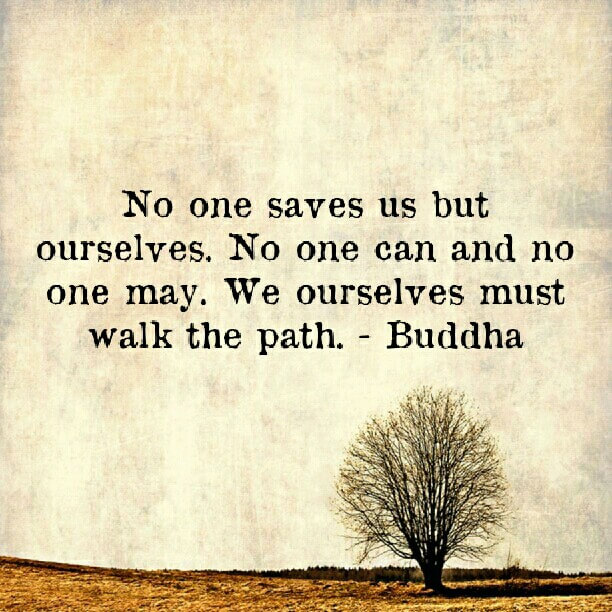
The reason we put up with and accept a work culture that perpetuates and celebrates horrible lifestyle choices every single day is fear.
We are afraid that if we fight back or say no, we will simply be replaced.
And we will.
Because there are always going to be more flies.
There will always be people willing to put themselves through hell for the sake of a paycheck, another credit on the résumé, another rung on the ladder.
The only way this vicious cycle stops is if we change the culture until we reach the point where there simply are no more flies.
“IT WAS JUST ONE ANT”
Our time is our most valuable asset in life, but unfortunately it’s not like a 401k. We don’t get to set it aside but then have it returned to us tax-free plus interest 30 years later. Once we spend it, it’s gone.
Start prioritizing your time as if you don’t have any left.
If you’re hoping someone is going to step in on your behalf and make sure you stay active throughout your day and take breaks…keep hoping.
If you’re wishing for your “crazy” schedule to get pushed just a day or two so you can catch up on sleep…keep wishing.
If you’re dreaming of the day when studios and corporations come to their senses and realize less working hours actually leads to increased productivity and higher quality work…KEEP. DREAMING.
Yes we should all band together and collectively fight for better contracts with longer turnarounds and less hours overall, but even new contracts can’t affect real change.
There is only one person that can affect change: You.
Change is going to happen in the trenches one soldier at a time.
It’s time to stop thinking of ourselves as flies and start thinking of ourselves as soldier ants.
As a father of two young kids, I spend A LOT of time watching Pixar movies, and one of my favorites is A Bug’s Life. While my kids may overlook the following scene, there is a tremendously profound moment when the grasshoppers realize their power is nothing compared to the ants if they were to stand together.
“You let one ant stand up to us, then they ALL might stand up! Those puny little ants outnumber us 100 to 1. And if they ever figure that out, there goes our way of life.”
Only banded together can we demand the respect we deserve and affect real change for ourselves and future generations of “creatives” just entering this industry with stars in their eyes and love for their craft in their hearts.
Only collectively can we do what is necessary to fight back against the impossible deadlines, the long hours, and the poor working conditions.
One ant at a time.
It Starts With You
The next time you’re sitting alone in a dark room feeling like the weight of the world is on your shoulders and yours alone, remember there is a worldwide community of creative people like yourself fighting the same battle in dark rooms everywhere.
If you’re too afraid to stand up for yourself and you’re looking for a reason to muster up the courage to fight back, just remember this:
Your time is your most valuable asset, and no amount of overtime is worth sacrificing your health, time with your family, or your sanity.
Let’s get real Hollywood:
We create entertainment for a living. We’re not curing cancer.
Additional Reading & Listening:
Sitting Is Killing You, But Standing Isn’t the Answer (Neither Is Exercise)
Are Creative and Tech Workers the New ‘Blue Collar?’ | with Maxim Jago
It Is Possible to Be Both Successful and Kind at the Same Time
Surviving 50+ Years In Post | with Walter Murch, ACE
I Was Tired of Putting My Kids to Bed via Facetime Every Night. Here’s What I Did About It.
Life After 3 Heart Attacks In 24 Hours | with Marc Wielage
1 Starrett, Kelly (2016-04-26). Deskbound: Standing Up to a Sitting World (p. 8). Victory Belt Publishing.
Featured image courtesy of Jeremy Bishop via Unsplash.com

